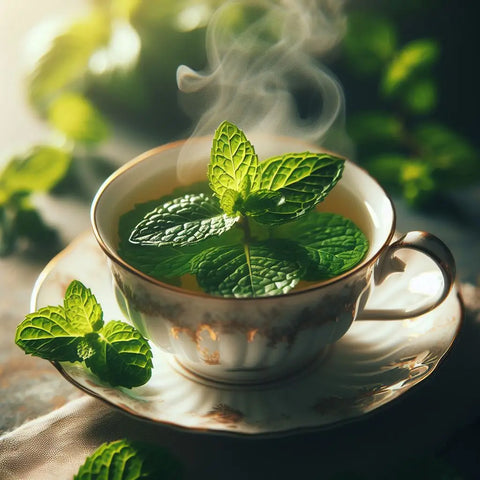Relieve Stomach Discomfort with Peppermint Tea
Quieting Stomach Issues with Peppermint Tea
Peppermint Tea
What is Peppermint?
Peppermint, scientifically known as Mentha × piperita, is a popular aromatic herb renowned for its refreshing and invigorating qualities. It’s a hybrid between watermint and spearmint and boasts a distinct flavor and aroma profile.
What is the scientific name of Peppermint?
This herb indeed goes by other common names, including “Mentha balsamea,” “Brandy Mint,” and “Balm Mint.” The diverse nomenclature reflects its wide recognition and historical significance.
Does Peppermint have other common names?
Peppermint has a rich history of medicinal use, dating back to ancient civilizations. Traditionally, it was employed to alleviate digestive discomfort, such as indigestion and gas. Its soothing properties extend to respiratory health, aiding in congestion relief. Modern medicine acknowledges peppermint for its potential to ease irritable bowel syndrome (IBS) symptoms, thanks to its muscle relaxant effects on the gastrointestinal tract.
What is Peppermint’s traditional and modern medicinal use?
Peppermint is a treasure trove of beneficial compounds. It’s rich in vitamins like A and C, both known for their immune-boosting properties. It also contains essential minerals such as calcium and potassium. Moreover, peppermint’s strong flavor and aroma are primarily attributed to its high concentration of menthol, a natural compound with a cooling sensation.
What nutrients (vitamins, minerals, antioxidants, etc.) does Peppermint contain?
Furthermore, this herb boasts an array of antioxidants, including rosmarinic acid and flavonoids, which help combat oxidative stress in the body. These antioxidants contribute to peppermint’s overall health benefits and make it a versatile ingredient in culinary and herbal remedies alike.
How should Peppermint be prepared or consumed (e.g., tea, tincture, capsules, tablets)?
Peppermint can be prepared and consumed in various forms, depending on your preference and intended use. Common methods include:
- Peppermint Tea: Steep fresh or dried Peppermint leaves in hot water for a soothing herbal tea.
- Tincture: Peppermint tinctures are alcohol-based extracts that can be taken in small doses.
- Capsules or Tablets: Peppermint supplements are available in capsule or tablet form, providing a convenient way to consume them.
- Essential Oil: Peppermint essential oil can be diluted and used topically for aromatherapy or applied to the skin for various purposes.
Where is Peppermint usually sourced or cultivated?
Peppermint is primarily sourced and cultivated in various regions around the world, including the United States, Europe, and Asia. It thrives in temperate climates and is often grown in both commercial farms and home gardens. The specific region of cultivation can impact the flavor and aroma of the peppermint, with some varieties being more prized for their essential oil content.
What is the best time of day to take Peppermint?
The best time to take Peppermint supplements depends on your individual needs and preferences. Many people find it beneficial to take them before or after meals to aid digestion or alleviate digestive discomfort. However, others prefer taking them in the morning to enjoy the potential energy-boosting and mood-enhancing effects. Ultimately, the timing should align with your goals and how your body responds to Peppermint.
How does Peppermint taste, and can it be mixed with other herbs or foods for palatability?
Peppermint has a refreshing, minty taste with a slightly sweet undertone. Its pleasant flavor makes it a versatile herb that can be easily mixed with other herbs, foods, or beverages. You can use Peppermint leaves to make herbal teas or infuse its flavor into various dishes, such as salads, desserts, or even savory dishes like lamb or vegetable stir-fries.
What other supplements work well together with Peppermint?
Peppermint can be effectively combined with several other supplements and herbs to enhance its benefits and address various health concerns. Here are some complementary supplements:
Ginger: Combining Ginger with peppermint can be excellent for digestive health. It helps alleviate nausea, bloating, and gastrointestinal discomfort.
Probiotics: Pairing peppermint with probiotics can help support a healthy gut microbiome. This combination can improve overall digestion and relieve symptoms of irritable bowel syndrome (IBS).
Fennel: Fennel and peppermint are a dynamic duo for digestive relief. They work together to reduce gas, bloating, and indigestion.
Chamomile: Combining Chamomile with peppermint creates a soothing blend for relaxation and digestive comfort. This blend is particularly effective for calming upset stomachs.
Lemon Balm: Lemon Balm and peppermint can be used together to reduce anxiety and promote relaxation. This combination is excellent for those looking to ease stress and tension.
Turmeric: Peppermint, Ginger, and Turmeric make a potent trio for reducing inflammation and joint pain. This combination can be beneficial for individuals with arthritis or other inflammatory conditions.
Lavender: Combining peppermint and Lavender can create a calming effect, making it useful for reducing anxiety and promoting better sleep.
Cayenne Pepper: If you’re looking to boost metabolism and promote weight loss, combining Cayenne Pepper with peppermint can be effective. Both herbs have thermogenic properties.
If you've ever experienced the trouble of an aggravated stomach, swelling, or heartburn, you understand how debilitating it will be in general. From hampering your regular activities to causing broad wretchedness, these stomach issues can be a certified unsettling influence. Fortunately, nature has given us a direct yet convincing fix as peppermint tea for stomach bothers. This fragrant and stimulating beverage has been used from here onward, indefinitely a truly prolonged stretch of time to lessen different stomach-related fights, making it a go-to deal with any consequences regarding those searching for help.

The Power of Peppermint:
Peppermint (Mentha piperita) is a mutt plant that shares a spot with the mint family. Its leaves are rich in menthol, a compound that gives peppermint its obvious, cooling smell and flavor. Anyway, this plant is a different option from a culinary joy; it has striking supportive properties, particularly concerning easing stomach loads.
When consumed as peppermint tea for stomach issues, the menthol and various blends in the tea return their charm in more than one way. In any case, they are probably a trademark antispasmodic, helping to relax the smooth muscles of the gastrointestinal framework. This can lessen issues, fits, and the misery related to conditions like disagreeable inside problems (IBS) or female fits.
Moreover, peppermint tea for stomach issues has been shown to lessen gas and enlarge. The blends in the tea help to relax the muscles in the stomach-related organs, taking into account a better launch of gas and lightening the strain and misery that much of the time goes with expanding.
Moreover, peppermint tea for stomach prosperity may, in like manner, support absorption by propelling the production of bile, which helps with isolating fats and working with the ingestion of enhancements. This can be particularly productive for individuals who experience heartburn or lethargic ingestion.
Peppermint Tea for Stomach: The Benefits:
Essentially incomprehensible for its ability to quietly tolerate hardships, peppermint tea for stomach prosperity offers a huge gathering of various benefits that make it a critical extension to your wellbeing plan:
Quieting properties:
The blends in peppermint tea have been found to have alleviating influences, which can help with decreasing disturbance in the gastrointestinal framework and lessening aftereffects related to conditions like Crohn's disease or ulcerative colitis.
Stress easing:
The resuscitating aroma of peppermint tea for the stomach can fundamentally influence the mind and body, helping with lessening tension and anxiety, which can demolish stomach-related issues.
Respiratory assistance:
Peppermint tea for stomach issues may in like manner give lightening to respiratory sicknesses like colds, hacks, and bronchitis, as it can help with clearing stop-ups and ease sore throats.
Cerebral torment help:
The menthol in peppermint tea for the stomach has a cooling influence that can help with decreasing strain in cerebral torments and migraines.
Peppermint Tea for Stomach: How to Make It
Making peppermint tea for stomach pain is unimaginably fundamental and requires several trimmings. This is the manner in which you can set up a quiet cup of this local fix:
Trimmings:
1 teaspoon of dried peppermint leaves (or 2-3 new peppermint branches)
1 cup of high-temperature water
Honey or lemon (optional, for added character)
Bearings:
- If using dried peppermint leaves, place them in a teapot or directly into a mug.
- Pour the high-temperature water over the peppermint leaves and allow them to splash for 5-7 minutes. The more you steep, the more grounded the flavour will be.
- If using new peppermint twigs, gently injure or pound them before adding them to the warmed water to convey their oils and flavours.
- At the point when the peppermint tea for the stomach has splashed, take out the leaves or branches.
- At whatever point is needed, further develop your peppermint tea for the stomach with a teaspoon of honey or add a splash of new lemon juice for added character.
Peppermint Tea for Stomach: When and How to Consume It
For best results, it's recommended to taste peppermint tea for about 30 minutes before a banquet or whenever you experience trouble. This allows the tea to accomplish something astounding and provide assistance before you eat food, which can often worsen stomach-related issues.
It's similarly basic to observe that while peppermint tea for stomach issues is overall safe for by far most, those with gastroesophageal reflux infection (GERD) or hiatal hernias could have to converse with a clinical consideration capable preceding consuming it, as it would perhaps disintegrate incidental effects on occasion.
Final Words
Pursuing stomach-related wellbeing, peppermint tea for stomach issues stands out as a trademark and fruitful fix. Its quieting properties, combined with its ability to ease up an extent of stomach burdens, make it a critical development for any prosperity weapons store. Along these lines, the accompanying time you wind up grappling with an enraged stomach, swelling, or indigestion, pursue a steaming cup of peppermint tea for stomach help and let areas of strength accomplish something astounding. Embrace this worshipped fix and experience the calming effects of nature's overflow.

FAQS
Might I, at any point, drink peppermint tea for my stomach while pregnant?
Peppermint tea for the stomach is generally remembered to be okay for usage during pregnancy when consumed with some restriction. Regardless, it's best for each situation to chat with your clinical benefits provider, especially in case you have a foundation set apart by ensnarement’s or are experiencing energetic stomach-related issues.
Will peppermint tea for the stomach help with squeamishness?
Without a doubt, peppermint tea for the stomach can be helpful in easing up disorders and hurling. The menthol in peppermint genuinely influences the stomach muscles, which can diminish squeamishness and settle the stomach.
How often as possible would I drink peppermint tea for stomach issues?
There is no defined boundary on how much of the time you can consume peppermint tea for stomach issues. In any case, it's all around recommended to limit your intake to 2-3 cups every day to avoid potential accidental impacts like heartburn or participation with drugs.
Might kids ever drink peppermint tea for stomach harm?
Peppermint tea for stomach issues is all around alright for youths when consumed with some restriction. Regardless, it's fitting to chat with a paediatrician before giving peppermint tea to infants or little children, as their stomach-related systems may be more fragile.
Will peppermint tea for the stomach help with obstacles?
For sure, peppermint tea for the stomach can help with decreasing blockage. The menthol in peppermint relaxes the smooth muscles of the gastrointestinal framework, which can propel strong releases and straightforwardness.





Leave a comment